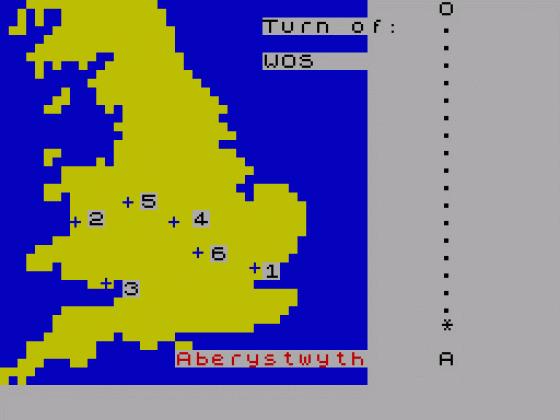
ZX Computing
 1st December 1984
1st December 1984
Categories: Review: Software
Author: Jim Lock
Publisher: Sinclair Research
Machine: Spectrum 16K
Published in ZX Computing #16
Geography 1
Early entrants to the Spectrum educational software scene were ICL with a series of programs entitled "Fun To Learn". With the notable exception of Geography 1, the series was very disappointing. I was struck then by Geography 1 and it still stands out was one of the very few worthwhile educational packages for the smaller Spectrum.
The cassette is attractively presented with a colourful inlay card giving clear loading instructions but very little information as to the program contents. It does, however, contain a useful warning to start the program with GO TO 1 and points out the unfortunate effect of using RUN.
Two separate programs are recorded on one side of the cassette, Towns in England and Wales and Countries and Capitals of Europe. Loading a program produces a screen of well laid out instructions on how to play and the types of question used. Up to four players can take part in what is best described as an educational race. Each player is asked, in turn, to enter their name and then choose a colour. With the preliminaries sorted out, the program begins.
In the first program, a map of England and Wales is printed on the screen in yellow and blue, using low resolution graphics. The screen also shows a vertical row of dots for each player, in that player's chosen colour. These rows are the score lines - correct answers being rewarded by the substitution of two coloured blocks for dots in the player's row. The player whose line reaches the top of the screen first is the winner.
The name of the first player is shown, followed by the first question. There are two types of question in the program - with one, a cross is printed on the map and a numbered list of towns shown. You choose the town on the list which you think is situated at the site of the cross and press the corresponding number key. The second type of question shows the name of one town only and prints several numbered crosses on the map. You decide which cross is closest to the location of the given town and press the number key as before.
Players are asked questions in turn, until one succeeds in reaching the top with his score line. A flashing "Victory" message is then displayed, followed by a "new game or quit" option.
The programs have been well devised and are genuinely challenging. The questions can vary considerably in difficulty (Who was it who once said, "A difficult question is one you don't know the answer to"?). Occasionally, the program's random selection of names to fill the menu can result in a really awkward question. I was once faced with having to decide whether a cross on the West Coast of England was over Blackpool or Southport... and I was wrong! The cassette could easily be retitled "So you think you know about Geography?" as it closely resembles that type of quiz with deceptively simple-looking questions requiring absolutely accurate answers. Your ego may show a few bruises after each game, but you will be pleasantly surprised at the amount of knowledge gained.
The inclusion of a competitive "race" element is an excellent idea, adding greatly to the enjoyment of the game. You might think that it would be difficult for a whole family to compete fairly, due to differences in ability, and up to a point you ould be right - but not for the obvious reason. Our two daughters regularly beat my wife and I hollow! Part, if not all, of the reason for this is their invention and implementation of a grossly unfair handicapping system - the girls used an Atlas!
The maps are fairly accurate, which is important with this type of program, but being composed of graphics blocks, have a somewhat crude appearance. This is far more noticeable on the map of Europe, the scale and chunky graphics giving some very odd-looking results - Great Britain, for example. This is more of an idiosyncrasy of the program than a genuine cause for criticism, though. Considering the limited amount of memory available on the 16K machine, the programmers have done as good a job as is humanly (and Spectrumly) possible.
Educationally, these programs are excellent, being informative without being boring, and succeed in imparting a great deal of geographical knowledge without the recipient being aware of any learning process going on at all.
Software producers have tended to overlook the subject of geography, preferring instead to concentrate on relatively easy-to-produce programs for teaching maths and languages. The neglect is regrettable and in one respect astonishing - can you think of a better use for a sophisticated computer than drawing beautiful maps?
Come on, ICL, where is Geography 2?




